Here is my own talk from the Vaasa seminar. Some of this was actually not spoken out loud, in two places I skipped a little to fit into my given timeslot.
I posted a summary of the rest of the seminar separately.
**
Doing business with nerds
Henrik Ingo
6.10.2006 Vaasa
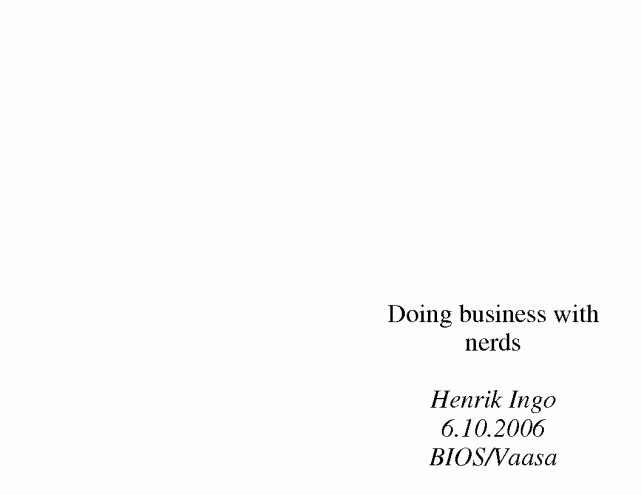
[Present myself.]
A month ago I was up here on the west coast, in Pietarsaari, to celebrate my fathers 60 year birthday. And at this birthday we looked at a photo album containing photos from his childhood.
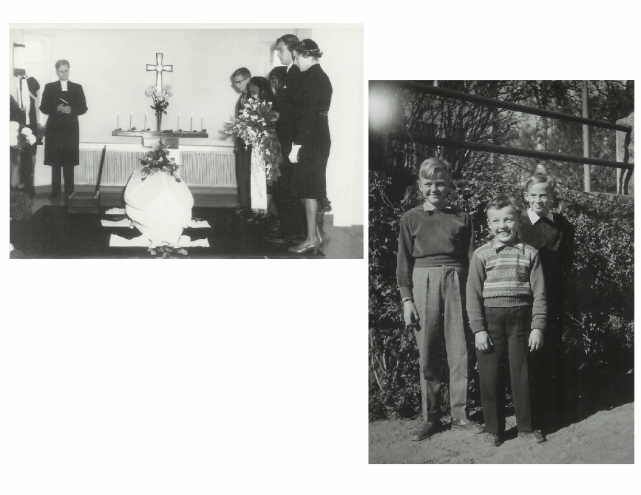
My grandfather died quite early, at the age of 50. Since my father was the youngest sibling, he was still just a boy going to school when this happened. So for him it was a very hard time, obviously. When he sometimes tells us about his childhood, it has become clear to me that just graduating from school -- or even just continuing with life in general -- during those circumstances was an achievement.
He also then told us about his friends of that time. So while everyone in the family were mourning the loss of the family father, his best friend Steffe would buzz on the door and stand there smiling as if nothing had happened: "Hi! So are you coming for a bicycle ride today?"
Another friend would make a point of taking him along to the sea scout activities every week -- even though my father had never before had anything to do with the sea scouts.
This is what my father said about them now on his 60th birthday: "These and some other friends saw that I was going through a really difficult time, and they took action to help me through it. I have them to thank that I didn't seriously mess up my entire life back then."
Ok, so this was the sobby part of my story, from now on it gets better. Because after this my father made an interesting comment. He said "In hindsight it is interesting to note, that the friends that took action and cared about me, later grew up to become engineers working in technical fields. On the other hand some of my class mates did not show this kind of caring, were perhaps quiet or even asocial types that would not talk to anybody except the teachers. And all of these kids then grew up to become doctors, psycologists, teachers and other professions, where they have to talk to people and care about their problems professionally every day."
After this, I realised that my father had just given me a great story to open my talk with here in Vaasa.
When we talked with Rainer about what I could present here, I started by presenting some of my usual topics I've been talking about after publishing my book. Things like Open Source business models, or useful concepts for evaluating and acquiring Open Source software in an organization. But Rainer said: "No no, you should talk about the things that you wrote about in your book." So I was thinking to myself, my book is about Open Source business models. But then finally I understood what he was looking for and eventually we decided that I should talk about something less technical -- about nerds. And we decided to position me in the last timeslot, so you can all take a comfortable position in your seats, relax after a long day and perhaps listen to my stories about nerds.
When I started studying in Otaniemi Technical University in the 90's, we used to say "Yes we are nerds, and we are proud of it!" One of my tutors in my freshman years said that he had been sitting on a saturday night at his computer, and outside the window -- he lived in the dorms close to school -- so outside his window a kid had passed by and shouted: "So are you one of those nerds?" ("Ai ootsää joku nörtti vai?" in Finnish.) To which he had answered: "Yes, and I'm proud of it."
Actually we did some really nerdy stuff during my freshman year. Once my freshman group and this tutor we all went to a computer class room, sat next to each other each with our own computers and chatted with each other on IRC without anybody speaking out loud for about 2 hours. I can see that a couple of the guys with laptops here are doing the same right now :-)

It is great to be a nerd at this point in history. We nerds created the Internet. Well, we created computers and electricity to begin with. Nerds also create cell phones, space communication satellites. Even TV -- by the way, the first Finnish TV broadcast was done by some students in my school, who thought the technology was cool. Last year was the 50 year anniversary of this event. The company they created was later bought by the government and is now our channel YLE2 in Finland.
Thinking of how much all of these things have changed our lives in the last 100 years, I think it is safe to say that we nerds are a dominating, if not ruling power in this time in history. So it is great to be a nerd.
Even when it is commercial enterprises that are driving the technological revolution -- as is the case with mobile phones or lets say Microsoft and Intel in the 90's -- the driving force behind this is a vast army of nerds. Unfortunately, in these cases it is often a vast army of anonymous nerds, who do their labor quietly while the company is represented to the public by business managers, lawyers and marketing. The nerds typically have to sign a contract where they are forbidden to talk about what they are doing there, but we now they are the ones to thank for everything.
But when we are dealing with Open Source technologies -- and let me remind everyone once again that this includes almost anything that has to do with the Internet -- so when we are dealing with Open Source, you actually get to see the nerds. Development happens in the open, everybody can be a part of it or at least see what is happening. It's like reality TV.
In fact, this open development process has worked so well, that there is actually very little need for lawyers and managers. The nerds are now openly in charge of what they are doing. And the few lawyers that are involved in Open Source matters often can be counted as nerds too.
Which brings us to the point of my talk. Now you are here at this seminar talking about Open Source, learning about where it is going, learning about how to make business with it, or learning how to benefit from Open Source software within your own organization. And I'm here to tell you that when getting involved in Open Source, you will be dealing with a lot of nerds.
And the point of my opening story was, that this is ok, you should feel privileged if you have nerd friends or business partners -- or of course if you count yourself as being one among us nerds. I guess I'm trying to say, that nerds are worthy of ruling the world.
It is a common stereotype that nerds are silent and shy people, perhaps even difficult to get along with. But if you think of all the communication systems nerds have created, you could almost claim the opposite is true. Nerds obviously love to keep in thouch with each others. Or maybe both of these are true. I once heard someone saying, that nerds prefer to communicate by various technological means, so as not to be directly exposed to the other party of the communication. At least this is why Finns love SMS text messages so much. It is a minimized form of communication. You can say what needs to be said, but with as little interaction as possible, like in an Aki Kaurismäki movie.
When the local newspaper Pietarsaaren Sanomat found out that a son of this little town had published a book, they did a full page interview about me and the Open Life book. One of the first questions touched the subject of the nerd or engineer stereotype: "Excuse me for saying so, but your book is rather deep and insightful to have been written by an engineer." So I tried to explain that the opposite is true. That contrary to common belief, most engineers are sensitive people and deep thinkers. They have to be that way, because every day they are working with solving problems of other people. Problems like, how could this company work more effectively? How could we help so that this person's job could be easier? How could this grandmother be in thouch with her grandchildren who live in Jakarta? How could they talk to each other? How could this semi-conductor produce light cheaper than our current light bulbs so that poor countries could afford them, and using less energy thus being more enviroment friendly?
All of these are things I do for work or on my free time, just like all other engineers. Well, except for the last one, that is Professor Shuji Nakamura, receiver of this year's Millenium Technology Award.
Since this is supposed to be a lightweight presentation, I was not going to produce any slides, but I did make one slide just to sum up what I'm saying.
1. We have established that we have nerds to thank for many of the crucial cornerstones of our everyday lives.
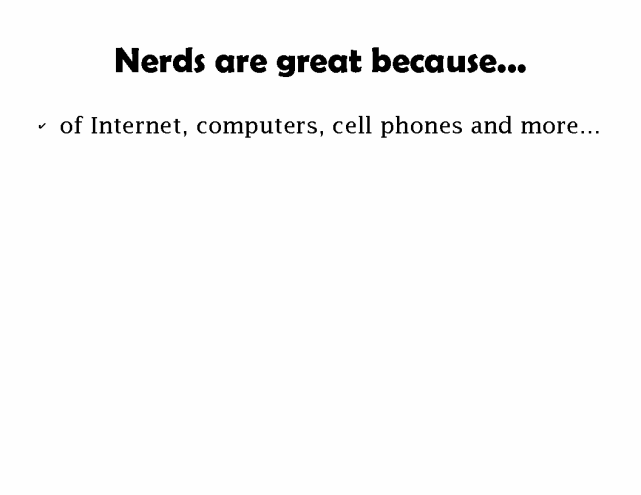
2. Also what I have been trying to say, is that nerds are nice people. We care about you and if you have a problem we like to help you with solutions to it.
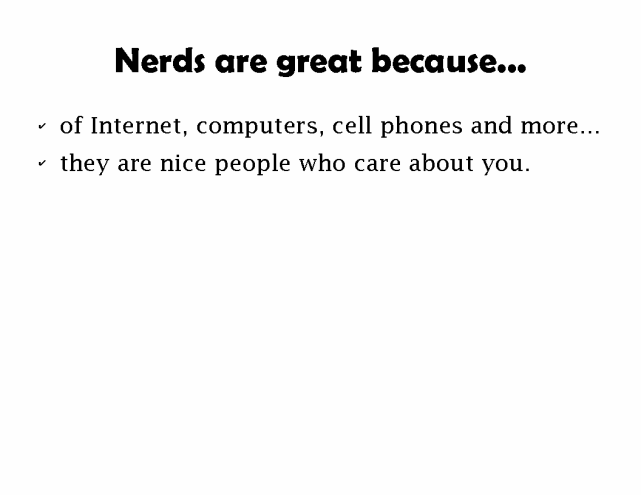
But it is true that often if you have a problem, it helps if you have someone you can talk to about it. The problem with an engineer is that he is just interested in your problem because he wants to solve it, not because talking about it in itself would be interesting. You may already know this if you are married to an engineer. In this case you should try to write an email to the nerd or chat with him over IRC.
But if you are looking for solutions to your problems, then you should be lucky if you have a nerd around.
**
3. The next point is good to know if you are involved or in contact with an Open Source project.
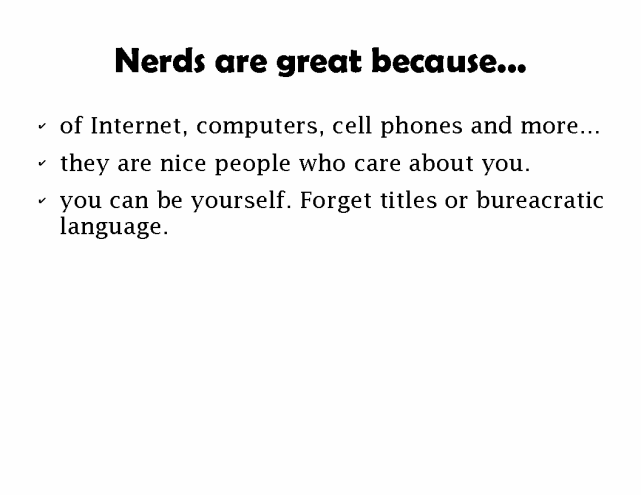
Open Source projects consist of human beings working together and talking to each other. It is important to understand that they do not consist of companies and other bureucratic entities. So when being involved with an Open Source project, don't make the mistake of sending your lawyer or PR department to talk to them -- that will have disastrous results. Just send a friendly email and be yourself, no need for any bureucratic language.
Also, if you happen to be a professor, or some European Union big-shot or a CEO of your company, it is good to know that as such your title will not mean much to the Open Source community. As I said, the Open Source community consists of individual people, without titles, and you can be yourself. Just relax and everything will be fine.
**
4. The only thing that does matter in the Open Source community is what you are contributing to it. So those programmers who have contributed a lot of Open Source code, they are respected. Of course you can contribute in other ways too. Let's say you have helped fight against software patents in the European Union. That would earn you lots of respect.
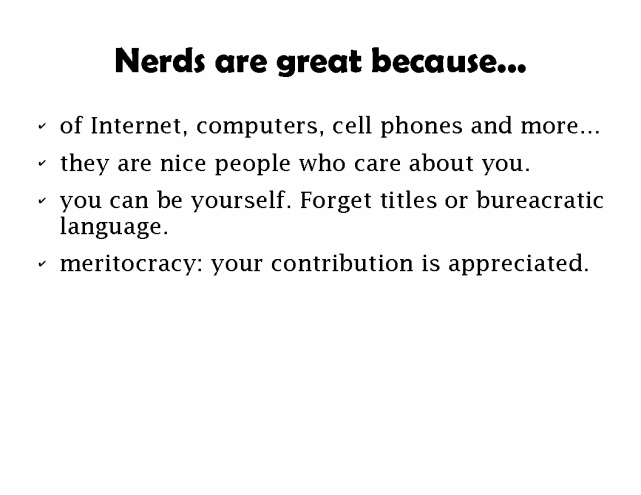
This system is sometimes called meritocracy. It is the hierarchy of the Open Source community. In this system your status depends on what you give to others.
**
5. If you have studied university level math, you know that in mathemathics, there are no opinions. Everything can be logically and 100% objectively be proven to be either true of false, period. There are no opinions.
Programming and engineering in general may not be quite as straigthforward, you can usually have an opinion on the best solution to some engineering problem, and there will be many options for a solution. But even so, when working in their engineering jobs, nerds tend to cultivate the habit of always striving for some kind of objectively true and right solution instead of maximizing personal gain with a suboptimal solution.
We have talked a lot in this seminar about public administration. In public administration, I know you have to deal with politicians, lawyers and lobbyists. So if you happen to be so lucky to be talking to a nerd one day, please -- please -- remember that nerds are a different kind.
As a practical example of the point I'm trying to make, say you are somehow involved in the issue of software patents.
And let's say you meet a representative of some large company who wants to share with you his opinion on software patents. Now I have also studied some elementary business courses in university. And what I learned there is that in business you should act completely rationally. So as a representative for a big company that happens to have a lot of software patents, there is nothing wrong or immoral in arguing for the issue of software patents. It doesn't matter that this person may even himself be aware that software patents actually stifle innovation in the IT field, and only help to monopolise the industry and protect the big companies from their smaller but more innovative competitors. If he happens to represent such a big company, he is doing the right thing in proposing more software patent legislation. It is his job to maximise the benefit of his company, and not care at all about society in general.
And with lawyers it is the same. A good lawyer can win an argument even when he is actually wrong. There is nothing wrong with that. Actually this is the definition of a good lawyer! The whole justice system of our western society relies on this principle.
I actually did not study political science in university. So I don't know whether they actually teach lying there. I kind of would like to think they don't. But unfortunately sometimes it seems like it is also quite legitimate for a politician to argue in favor of something that is good for his biggest campaign donators, even if it may not be good for society in general. And I was just thinking that while working with these politicians, if you have had such experiences, you may have grown used to not trusting people.
So what I really just wanted to say to you is that if you meet a nerd who wants to tell you his opinion on software patents. Now -- if he is a true nerd -- he will not be thinking of whether software patents are good or bad for himself, but he will actually be interested in the general good of all nerds, and society in general that we nerds wish to serve. You may want to keep this in mind when listening to nerds.
Now of course, the nerd may be wrong in his opinion. And this is another thing completely from being dishonest. If you think he is wrong, feel free to disagree with him. But also remember that he actually thinks he is objectively right. So you may get into some interesting debates.
But I just wanted to say, that nerds are not like lawyers, politicians and lobbyists.
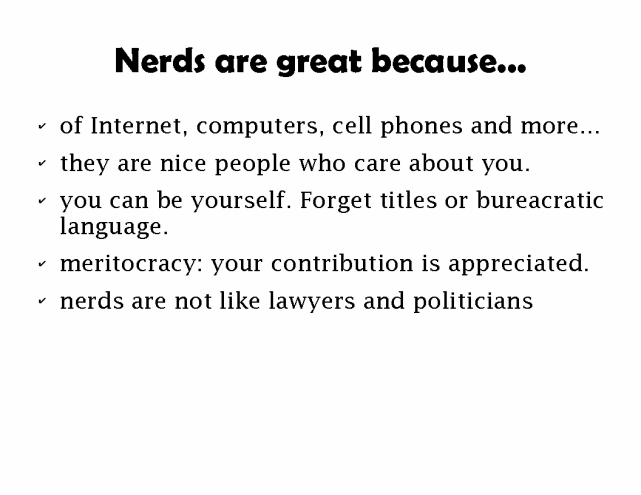
**
6. Of course, nerds are not perfect either, nobody is. But even so, to succeed in you Open Source project, you will need to get along with them.
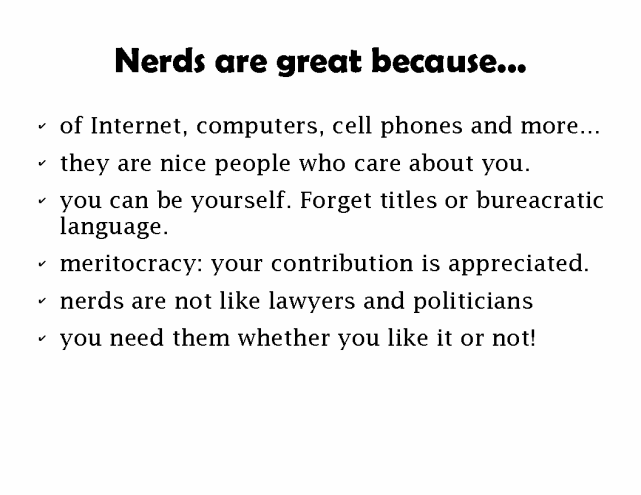
I can't help thinking of a collague I had in a place I previously worked at. He was a nerd, but also an über-guru. He can explain to you how hinting works with True Type fonts and why it is needed and why Adobe does not use it but uses anti-aliasing instead. He probably knows everything there is to know about Linux.
Once he was teaching a class of rather senior developers in Linux system programming. One guy wanted him to explain how system calls are implemented in Linux. He answered that nobody in this class will ever need that information. But the student was persistent, perhaps he really wanted to know or perhaps he just wanted to test the limits of my friend's knowledge. So eventually he opened some file in the Linux source codes -- which he obviously had with him -- and started going through a system call line by line, explaining what it did.
If you are doing IT projects, these nerds are what you want to have for your project to succeed. And so it was also in our Linux projects in that company, he was always the star and thanks to him there was nothing that we couldn't do.
But because he was a nerd -- even much more than I am -- he also had some nerdy habits. Once he was keeping the minutes of a project meeting. But then he realised that whoever had written the minutes of the previous meeting, had used two space characters after each sentence and not just one. So he started correcting that, removing one space from the end of each sentence.
So obviously somebody pointed out, that perhaps it is not that important whether some internal minutes that we keep have some extra spaces somewhere. "Of course I know that", he said smilingly, "but even so I cannot help myself. But please don't mind me, just continue with the meeting and don't let this distract you."
So we let him keep on removing the extra spaces, because quite frankly, we would have done anything to keep this guy happy. Because nobody else could have done some of the things that he did in the project.
**
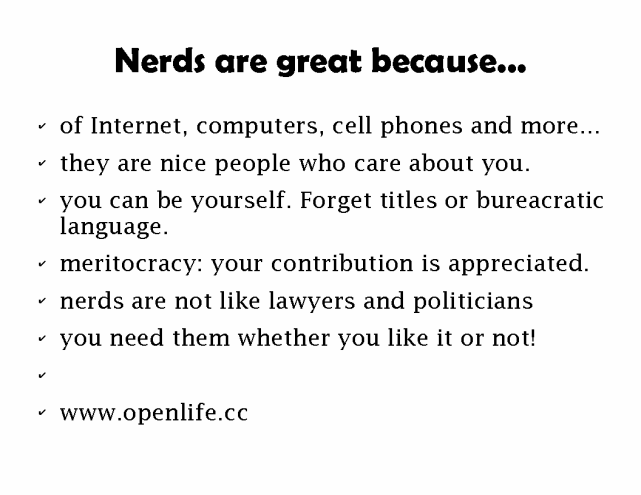
I'd like to close with recommending my own book if you are interested in knowing more about nerds and the Open Source community. But not because it is my book but I'd especially like to recommend the Epilogue written by Linus Torvalds himself. It is a text Linus has written about what it is like to manage the legion of nerds that work with him on the Linux kernel.
So I'd like to end by just reading a short piece of what Linus says in Chapter 3 of this Epilogue. In the previous chapter he has already meditated over the fact that most people are idiots, and the fact that as a manager he has to deal with them.
This text is known as Linux Kernel Management Style and you can read it online even if you are not interested in the rest of the book. It's worth a read even just for the literary style and dry humor of Linus'.
**
Chapter 3: People II - the Good Kind
While it turns out that most people are idiots, the corollary to that is sadly that you are one too, and that while we can all bask in the secure knowledge that we're better than the average person (let's face it, nobody ever believes that they're average or below-average), we should also admit that we're not the sharpest knife around, and there will be other people that are less of an idiot that you are.
Some people react badly to smart people. Others take advantage of them.
Make sure that you, as a kernel maintainer, are in the second group. Suck up to them, because they are the people who will make your job easier. In particular, they'll be able to make your decisions for you, which is what the game is all about.
So when you find somebody smarter than you are, just coast along. Your management responsibilities largely become ones of saying "Sounds like a good idea - go wild", or "That sounds good, but what about xxx?". The second version in particular is a great way to either learn something new about "xxx" or seem _extra_ managerial by pointing out something the smarter person hadn't thought about. In either case, you win.
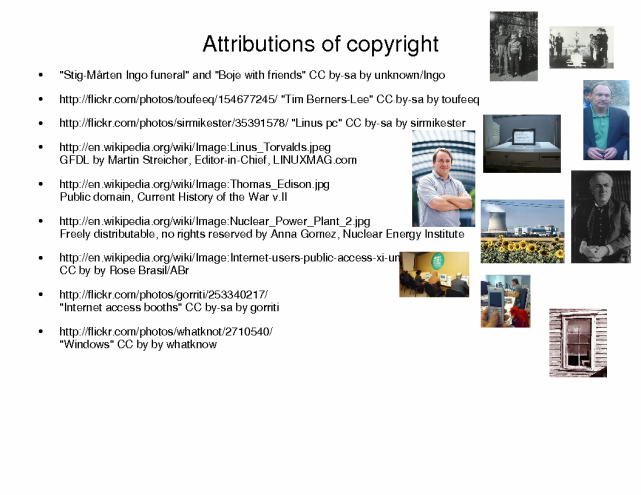
- Log in to post comments
- 10994 views
